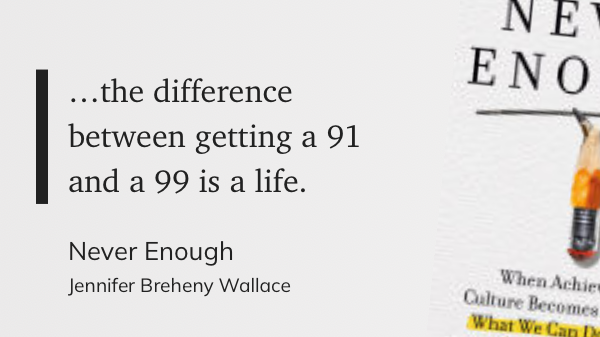My Reading & Ideas
New Read: Here Beside the Rising Tide
I recently started reading the new biography of Jerry Garcia by journalist and biographer Jim Newton. What first intrigued me about the book is that Newton, while a fan, is not an insider. Most of the many books about the Dead that have been published since Garcia’s death were written by insiders of one sort or another. Those sorts of books, especially memoirs by the band members themselves, are obviously great to read for big fans. However, I am now interested in reading a more distanced view.
I just started the book, but there are a few things I have already learned about Jerry.
- Jerry’s dad was a musician, but gave it up to run a bar in San Francisco.
- His father died when Jerry was only 5 years old. They left to go on a fishing trip and his dad drowned, so young Jerry had come home from that trip along with his mother, stunned by the sudden death of the family patriarch. I imagine that would have been an immensely difficult situation for such a young kid.
- Shortly after the passing of Jerry’s dad, he and his older brother moved in with their grandparents and Jerry’s grandfather sounds like a shitty grandparent. Jerry’s memory of his grandfather was apparently pretty negative. Considering the grandparents were taking the boys in after their father had died, it strikes me as particularly pathetic behavior.
- Jerry’s grandmother had other boyfriends while she stayed married to Jerry’s grandfather. Bill, Jerry’s grandfather, beat his wife once and after that she initiated what sounds like a Catholic divorce; essentially separated, but living in the same house.
I am less than ten pages in so I expect there is much more to learn about Garcia. If you are a Deadhead, check it out.
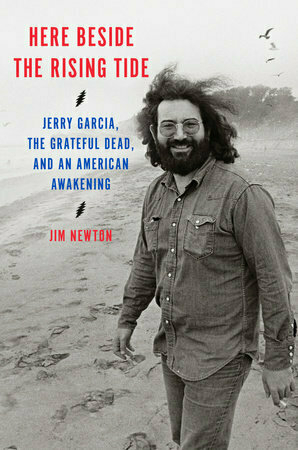
Hearing at the End
I am reading a book now called The Gift of Aging. In a chapter about the dying process the authors make the statement you can see below, that hearing is the last of the senses to fade during the death process. Digging in a bit, it seems hospice workers frequently notice that people who are dying and who seem unconscious often respond to the voices of their loved ones. This study supports these anecdotes.
My wife, being a devout Buddhist, has very specific instructions I am to follow were she to pass before me. Central to her wishes are keeping people away who are overly emotional, as well as playing Buddhist prayers on repeat.
The quote below got me thinking about what I want to hear if I am lucky enough to die at home with people around me who can carry out my wishes. The conclusion I have come to is that I don’t know and that I need to think about it, then make sure my wishes are known.
In the past I have assumed I would want my favorite music to be playing. But that isn’t an easy ask as I like a wide variety of music, and I would likely want to make sure aggressive tunes were not in the playlist. That means if music is my answer, I’ll need to make a playlist and make sure my spouse knows about.
Another possibility is to simply have my loved ones with me, talking to me so I can pass with their voices in my consciousness. However, like my wife, I wouldn’t want anyone to be too hysterical, as I am Buddhist enough to know that I want a calm mind as much as possible at the very end.
A third possibility is to have mantras that I love playing. There are many beautiful, long mantras available on YouTube that I have discovered over the years that might fit the bill. The ones I like definitely calm my mind and would be familiar to me, which I think would be helpful.
As of now, I still don’t know. However, I now realize this is something I should try and figure out. If I will be able to hear through to the end, ideally I am hearing something that is calming and brings happy memories. If and when I figure this out, I’ll post about it.
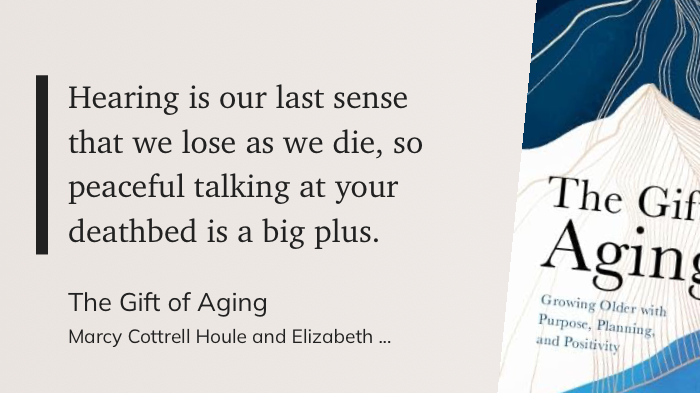
Saturday Football
I love college football. Growing up, I was mostly an NFL fan. Nowadays though, I watch football on Saturdays, not Sundays. I’m not sure I know why I love one so much more than the other. I root for a school I didn’t even attend (although I root for my alma mater too, they just aren’t as easy to follow since they are FCS and aren’t on TV very often). I root for Stanford, where my dad went to school, because that was the first team I learned to love as a kid. I think the first in person game I ever saw was the Big Game in either 1978 or 1979 (in Berkeley).
One thing I know is that my love for college football generally evolved over time. Indeed, my growing interest coincided with the rise of cable programming and the ubiquity of college football on TV. It also helps that about 15 years ago, Stanford started winning and for a few years were one of the country’s elite teams. Rooting for a team that wins is really fun and in my case stoked my interest. Now, though they are not very good, my memories of winning are there egging on my interest. “There’s always next week…or next year.”
This time period also coincided with the rise of Oregon football. Oregon State has also had some great teams over the past 25 years. When those schools do well, I found myself rooting for them too. The web of relationships between schools and conferences also played a role because I increasingly found myself rooting for Pac 10/12 teams against teams from other conferences. So, in addition to watching Stanford, I often found I had a rooting interest in a ton of other games every weekend, as well. I suppose this sort of logic could also be applied to the NFL in the sense that a fan would have a rooting interest against their favorite teams' conference rivals. However, for me, it was the college match ups that got me juiced.
That leads to another element of college football I like: the randomness of the match ups. There are so many colleges with Division I football teams that there are some really unique matchups between schools. With the new conference alignment, Stanford’s schedule is filled with schools they don’t have a history of playing. Increases my interest. Better than watching the Chicago Bears and New York Giants play for the 200th time.
Like all sports, college football is also filled with drama. For me, movies and TV shows often lack drama because they are either predictable or for some other reason I am unable to forget that I am watching something that is scripted. Saturday football can still surprise and many games come down to the wire, decided by randomness, amazing athletic ability that is a joy to behold, or something else totally unexpected. The Play comes to mind, as a Stanford fan.
Finally, I also used to make the argument that the players were playing for the love of the game; that they weren’t mercenaries. Sadly, that argument no longer holds. The money sloshing around college football has finally made its way into the pockets of the players and all of college athletics have been changed by the new NIL rules that are in place. I’m not sure I like the changes and I worry about what it will mean for schools like Stanford and Oregon State moving forward. Nevertheless, for better or worse, I’m still happily tuning out the bad craziness in the news and following along.

Moving Targets
Sam Wineburg is one of the brains behind the amazing website Digital Inquiry Group (which used to be called the Stanford History Education Group). The team behind DIG produces high-quality lesson plans for social studies teachers that focus on inquiry and expose students to a variety of primary and secondary sources. Their lessons also emphasize that there can be multiple views about what has happened in the past. I have happily used their lessons for years.
A few years ago I read Wineburg’s excellent book Why Learn History. The quote below resonated because it gets to an issue that the public, and many educators, aren’t familiar with. Namely, that the folks who make the tests are constantly redefining what counts, which makes the tests a bit less helpful than they could be. In Oregon, students’ knowledge of social studies content isn’t really tested. Certainly, if students are taking AP exams, they are taking standardized exams written by the College Board. However, as a veteran educator, I don’t put a lot of trust in their test results. The main reason for this is that test scores can yo-yo from year to year, even though what and how I teach isn’t all that different from year to year.
Moving the goal posts leads to another issue. When students demonstrate mastery of a particular skill or fact, that item might vanish from the test, not because it’s unimportant, but because assessors want to maintain a spread of scores. That practice means success can feel like it gets punished—today’s knowledge may not even register tomorrow. At the same time, it’s worth noting that there are moments when standards are lowered, which is an entirely different problem. Lowering expectations masks gaps rather than addressing them, creating a false sense of progress. Between shifting targets on one end and diluted benchmarks on the other, it’s little wonder that educators, parents, and the public often struggle to trust what standardized scores actually tell us.
On top of that, when I think about my own teaching, it is an absolute fact that I have gotten better as my career has continued. I’d say the quality of teaching generally is better than what one would have found broadly twenty-five years ago. We just know more about good instruction. Yet, the news and ‘scores’ don’t always reflect it.
At the end of the day, as both a teacher and a parent, I don’t put too much weight into test scores. I’m not opposed to standardized tests, but I try to keep in mind Wineburg’s point, that there are reasons, often hidden, that weaken their ability to inform.
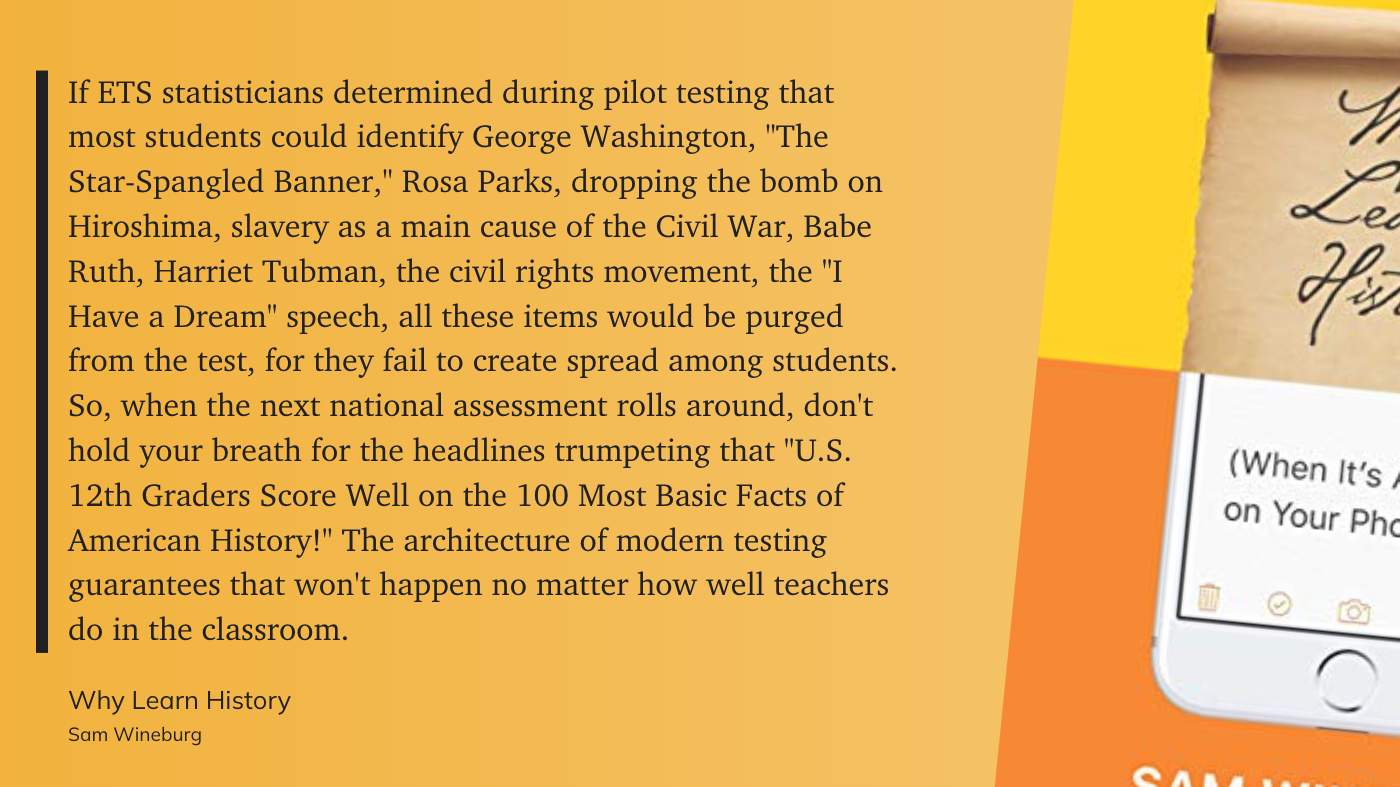
Links and Chains
Perhaps this landed hard for me because I am not a scientist. When I came across this quote in Rolf Dobelli’s excellent book The Art of the Good Life I was stunned because it provides a glimpse into our personal history that I hadn’t thought about much before.
King Louis XIV’s reign was from 1643 until his death in 1715. I find it cool to think about the fact that there were approximately 4,000 people walking around then that would give rise to me 300+ years later. Unlike the King of France, they were ordinary people, mostly lost to history. And yet I wouldn’t exist if it weren’t for them. I wonder who they were and what their lives were like. I also wonder (not having submitted my DNA to a company for testing) where exactly they lived? I suspect there were some in Holland, Scotland, England, Wales, Ireland, and Germany, but I’d love to know more about them.
Impermanence also comes to mind when thinking about this quote. Our lives are finite, but they matter to others and their effects ripple into the future.
Indeed, going the other direction, this quote makes me wonder who is walking around today (other than my wife) who will also be an ancestor of our progeny 300s years hence, if my DNA is so lucky.
The metaphor of a chain comes to mind. Each of us is a link in a chain stretching into the past and ahead into the future. A mystery of life is that we won’t know most of the other people in the chain, but they are there, unseen and unknown. And yet, we are still dependent on each other.
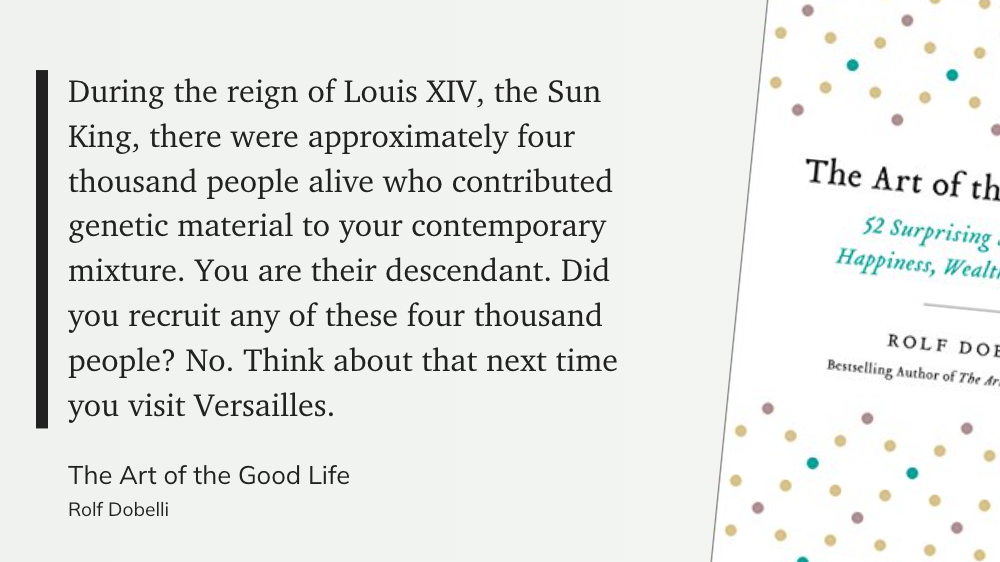
Start Today: What Ryan Holiday Reminds Us About Time
As a teacher, I hear students lament the frustrations of procrastination all the time. Just last week I asked some of my classes during a whip around what they want to improve on this semester. The most common answer was beating procrastination. Of course, teenagers aren’t the only ones who battle this problem. Steven Pressfield wrote a beautiful book about it called The War of Art. He called the problem The Resistance.
Fellow writer (and Pressfield friend) Ryan Holiday provides a helpful perspective on procrastination in the three sentences shared below. Whereas Pressfield frames procrastination as fear dressed in all of our endless distractions, Holiday goes a bit further and says it is arrogance. Together, they show both the inner and outer faces of the same issue.
I couldn’t save this quote into my second brain fast enough. It gets to the heart of the matter for me because it relates to the core Buddhist idea of impermanence. When I remember that nothing is guaranteed, not even tomorrow, it makes the decision to start today feel less like a burden and more like a responsibility. It is a fact that we could die at any time. Karma can shift on a dime. Most of us don’t think about that fact very often (that’s a whole other topic). Thus, Holiday is spot on; to put something important off because you think you will have time later is arrogant. It’s also true that if you lack the will and the discipline in the present, what’s to say you’ll have it in the future? For me, this shows up most clearly when I put off my short little home weight lifting protocol. I tell myself I’ll do it in an hour, but half the time it never happens that day.
Readwise, the app I use to capture these quotes while I read, allows you to pick favorites that they email to you every Sunday. This is one of those favorited Sunday quotes for me.
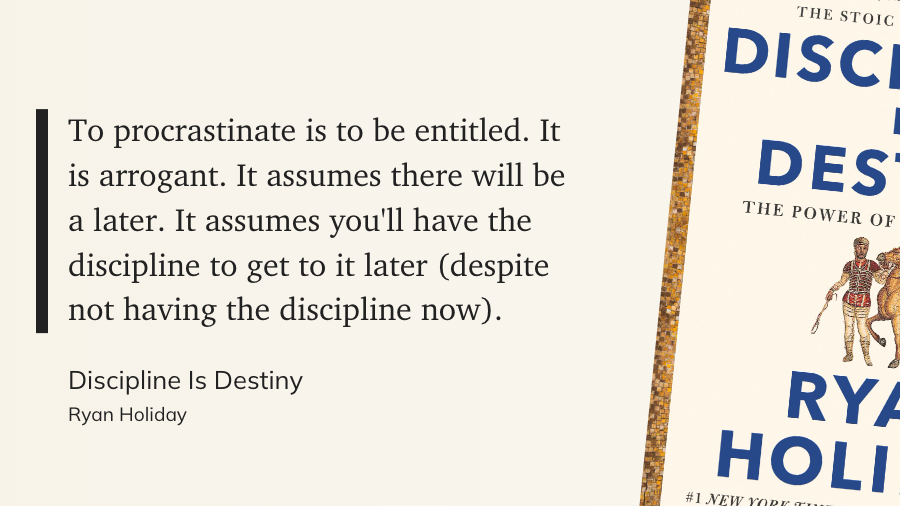
Michael Easter's Idea of Misogi
A misogi is a Japanese idea that has roots in Shinto purification practices. The idea is to ritually purify oneself by bathing in rivers, waterfalls, or the ocean. Samurai also adapted the practice to develop discipline, focus, and clarity. Writer Michael Easter wrote a great book called The Comfort Crisis. In it he adapts the idea of misogi to a modern western context. For Easter, a misogi is an epic personal challenge. He talks of scheduling one every so often, say every quarter or twice a year. I had never heard of the idea and can see why it is appealing.
The quote below resonates because of the idea that in the modern era social media has led many people to cultivate an image online. Misogis are personal, and private.
In preparing this blog post I decided to ask my AI of choice, which knows a bit about me, to provide some misogi ideas. I thought they were interesting so I’ll share them. What kind of misogi could you take on?
-
Go on a 7-day silent meditation retreat.
-
Fast for 3 full days (water and electrolytes only).
-
Complete a “no excuses” month: no alcohol, no sugar, no processed foods, daily workouts, daily journaling.
-
Learn a completely new skill (martial art, musical instrument, or language) and perform/demonstrate it publicly.
-
Teach a public seminar or workshop outside your usual classroom—stretching into a new audience.
-
Take P– on a multi-day backcountry trek, just the two of you.
-
Memorize and recite a long text (like the Bhagavad Gita, Gettysburg Address, or Declaration of Independence).
-
Build a “digital sabbath” habit by spending a full week unplugged from screens.
-
Swim across a large open-water stretch (lake, bay, or river).
-
Live abroad for a month with your family, immersing yourselves in a new culture.
-
Go on a 12 hour hike around Portland
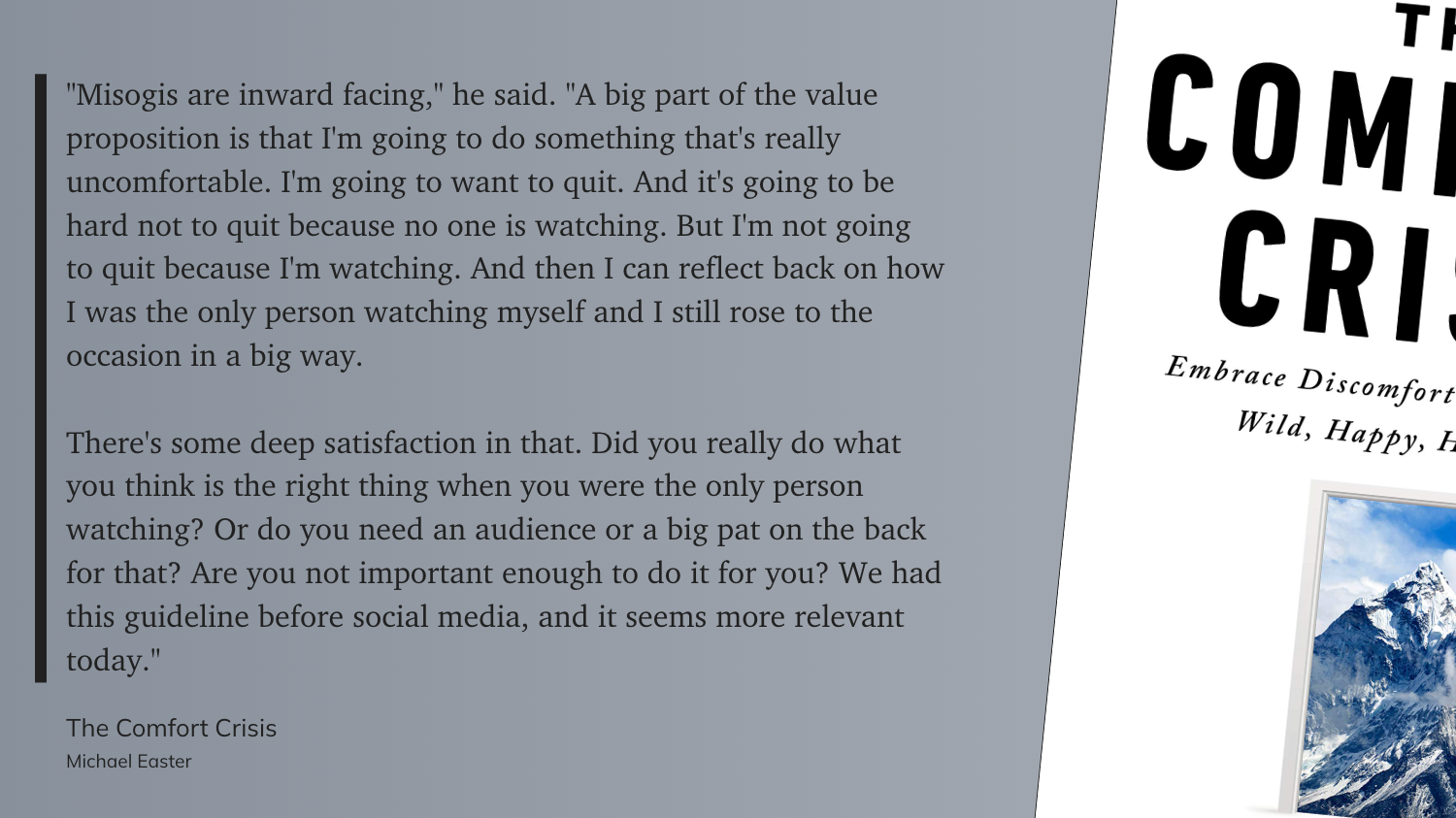
Effective, not Efficient
Brian Johnson is an amazing resource for those who want to learn about self improvement. I discovered him years ago because he produced what he called Philosopher’s Notes on the many books he read. Today he runs a company called Heroic that is focused on helping people and the world flourish. I highly recommend his book and other digital resources.
This quote hits hard for me. As a high school teacher, I am all about being efficient with my time due to the challenges of teaching (interfacing with 150 teenagers every day, email, planning, grading, hiking across campus just to make copies, dealing with all the other teacher admin we need to deal with–you get the idea). However, I find that I always feel rushed when talking to people individually outside of class and often give both students and colleagues less than my full attention. I know that is not ideal. After such an interaction, I can usually feel that I was not fully present and it leaves me disappointed. I saved this quote while reading Arete’ because it is a solid reminder that I need to reframe how I interact with people one-on-one at work. I’m still learning, and some days are harder than others, but I am getting better. I have come to realize that what’s true of productivity is also true of people: sometimes you’ve got to slow down in order to speed up.
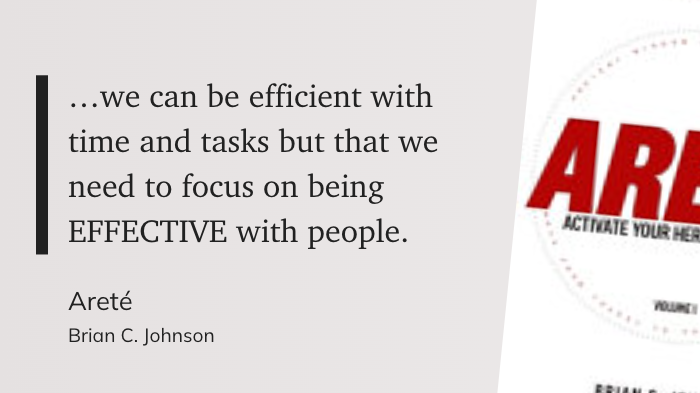
Alternatives to GDP
The novel I am currently reading is Kim Stanley Robinson’s The Ministry of the Future. (It is worth noting that Robinson lives in the awesome college town I grew up in.) In it he describes the problems with GDP as a measurement tool and mentions some alternative ways to measure how well a society (not just an economy) are doing overall. I found this relevant because GDP is something that always comes in my classes and it obviously has it’s flaws.
Here are some alternatives to GDP.
Genuine Progress Indicator Unlike GDP, which counts all spending as positive regardless of its purpose, the GPI subtracts costs associated with pollution, crime, and resource depletion while adding the value of volunteer work, housework, and education. The index was developed in the 1990s and aims to provide a more holistic view of progress by measuring whether economic growth actually improves quality of life rather than simply increasing total economic activity.
United Nations Human Development Index This index, created by the United Nations in 1990, combines life expectancy, education levels, and income to provide a broader view of human progress. Countries are ranked from 0 to 1, with scores above 0.8 considered “very high human development,” and the index has become one of the most widely used alternatives to GDP for comparing national development levels.
Happy Planet Index
The Happy Planet Index (HPI) is a measure of sustainable well-being that evaluates countries based on how efficiently they deliver long and happy lives for their residents within the planet’s environmental limits. Developed by the New Economics Foundation, the HPI combines life satisfaction, life expectancy, and ecological footprint data to calculate how much happiness and longevity a country achieves per unit of environmental impact. Wealthy nations often score poorly on this index.
Social Progress Index This index measures a country’s social and environmental progress independently of economic factors by evaluating three main categories: basic human needs (nutrition, medical care, shelter, safety), foundations of wellbeing (access to knowledge, information, health, and environmental quality), and opportunity (personal rights, freedom of choice, tolerance, and access to higher education). Initially published in 2013, the SPI deliberately excludes economic indicators to provide a clearer picture of how well societies meet their citizens' fundamental needs and create conditions for human flourishing.
Bhutan’s Gross National Happiness I’d heard of this one already. Introduced by Bhutan’s Fourth King in the 1970s and formalized into a measurable index in 2008, GNH evaluates progress across nine domains including psychological wellbeing, health, education, ecological diversity, time use, and community vitality. This approach has guided Bhutan’s policy decisions for decades, leading to constitutional requirements for environmental conservation and making Bhutan one of the few carbon-negative countries in the world.
End of August 2025 Reading Pile
There are a lot ways people can spend their leisure time. I have friends who spend a lot of time in the gym, and others that like go bird watching. My favorite way to while away the time is to read. Over the past 15 years I have slowly been the type of reading that has several books going at once. At first it was two to four books, and now it is as much as 10 or 11. I’m fairly sure I am in the minority when it comes to this reading habit. Nevertheless, it is my way of reading and I love it.
The picture below shows my current stack. There is only one novel and there is also a high school textbook. I don’t ever have more than one novel going and it is unusual for me to be reading a textbook. This particular book makes it easy though because it is broken down into two page subsections, so I can just read a spread or two and put the bookmark back in.
Usually there are one or two books that I spend more time on that I finish faster. That is not the case with this pile. These are mostly dense books that force me to consume in relatively small chunks at a time.
Once a month, towards the end of the month I am going to post my current stack. Books on the bottom are ones I have been reading the longest.
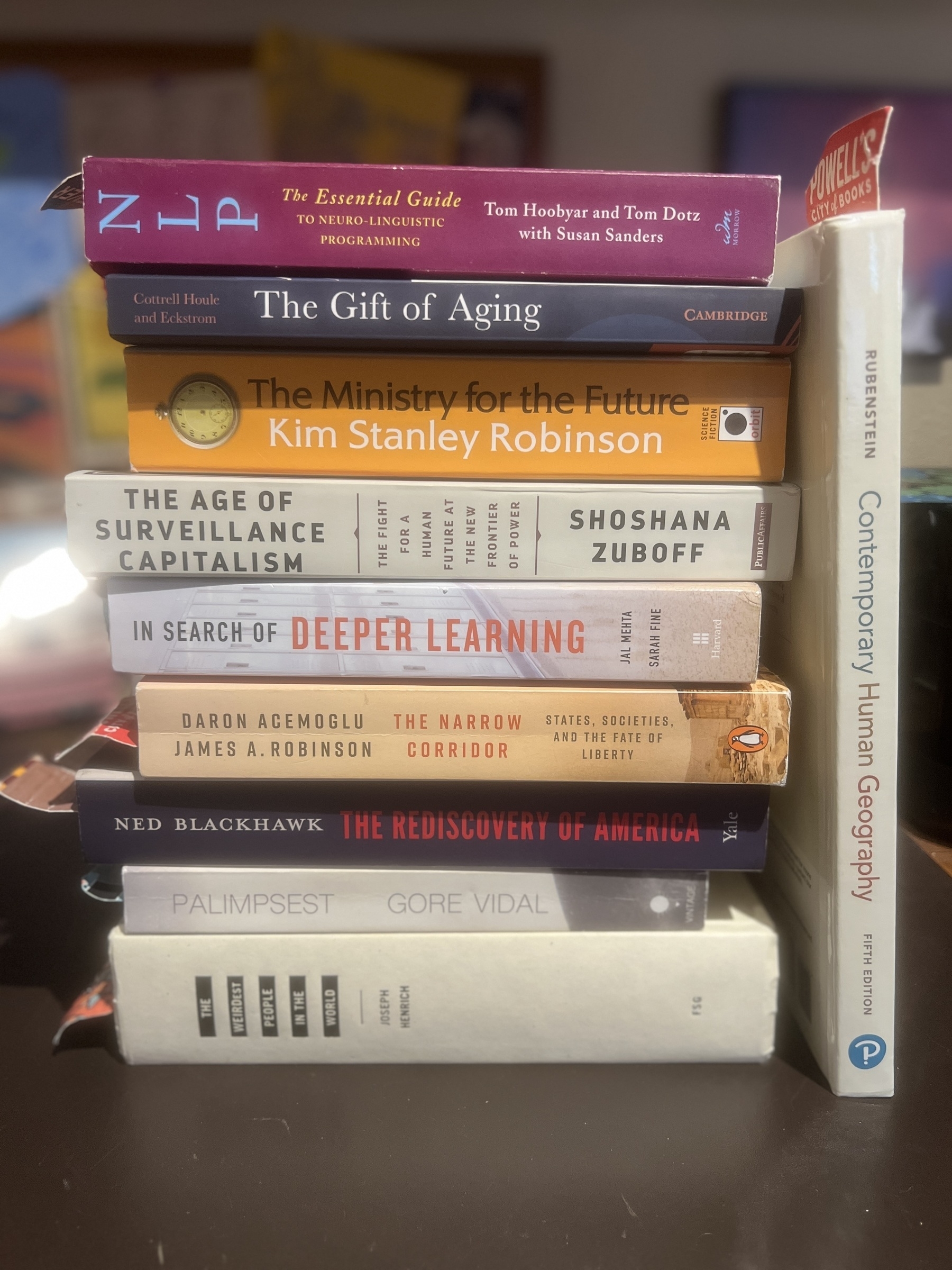
On Seth Godin's Reminder About Systems
Seth Godin is one of the world’s great bloggers because he publishes a thoughtful take every single day, and has done so for nearly 17 years. His posts are usually short, which I appreciate since I already have more than a handful of daily blogs and newsletters to get through. Godin is also a prolific author, educator, and well-known marketing thinker. Not everything he writes applies to my life, but often his ideas are both interesting and relevant. As a new blogger, I find him inspiring.
Earlier this year I finished his latest book, This is Strategy. I wouldn’t necessarily recommend it unless you work in marketing, but as usual, I found a few quotes worth saving and reflecting on. The one below resonates with me as a new blogger with no social media presence.
On one level, I think about the systems that exist for bloggers—Medium, Substack, LinkedIn. The main reason I have decided to blog is simply to practice writing and thinking in public on a regular basis (something Godin highly recommends). I’m not trying to become famous or turn it into a major source of income. Still, I want my ideas to reach others and to invite feedback and conversation. To grow an audience, though, I have to consider engaging with the systems that make that more likely.
Godin’s point helps me reframe the decision. Instead of focusing only on what these platforms can do for me, I need to ask what they will demand of me. For instance, posting through them means exposing myself to their algorithms, and I know from experience that’s a mixed bargain. Leaving Instagram, Facebook, and later Substack has been a real boost to my mental health, so I’m cautious about opening those doors again.
Even if I eventually choose to cross-post, Godin’s reminder will help me pause, reflect, and step in with eyes wide open. It also makes me wonder: what other systems in our lives deserve a closer look at how they shape our habits and our thinking?
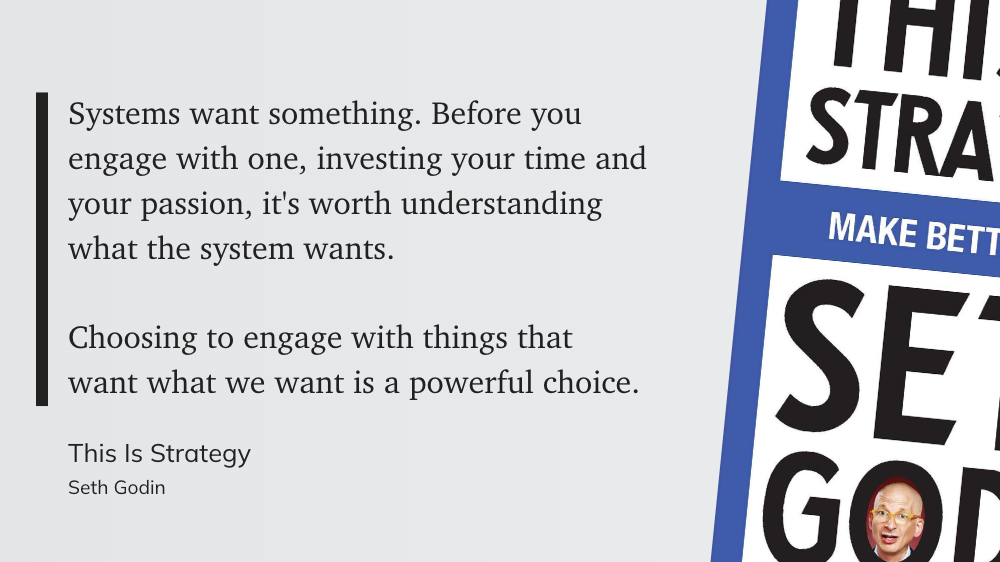
Avoiding the Ego Default
We all know the pull of wanting to be right, especially in the always online world many of us inhabit. It can be intoxicating. In a heated conversation, whether in person or online, the moment we sense our position getting battered, something inside resists; not because truth is at stake, but because our ego is. Shane Parrish–author, podcaster, and clear thinker extraordinaire–calls this the “ego default,” the drive to feel right at the expense of actually being right. I’ve felt it in staff meetings, political arguments with friends, and even small family squabbles. Hell, I even argue with myself while I am reading. Self-righteousness is deeply alluring.
The irony is that this insistence on being right usually blocks one’s growth. When I look back on moments when I dug in the hardest, I wasn’t always defending the truth; I was largely defending myself (even if I was correct on the facts). The hierarchy I built in my mind was designed not to clarify reality, but to protect my pride. Jonathan Haidt also writes about how reason takes a back seat to our feelings and views of the world in his book The Righteous Mind.
The alternative to this ever present issue is harder but richer: to pause, and to ask whether I’d rather feel right or learn something new. The question lingers for me: what parts of my life might shift if I chose truth over comfort more often? This is easier said than done and I am certainly no Jedi in this regard. However, Shane Parrish is correct. It pays to step back from our defensiveness and try to understand the other side. If done well, I think it actually strengthens one’s own position ultimately. Indeed, it not only strengthens our own position, but it also opens the door to genuine discussion instead of polarization and anger. What might shift in our communities, even our politics, if more of us chose truth over comfort?
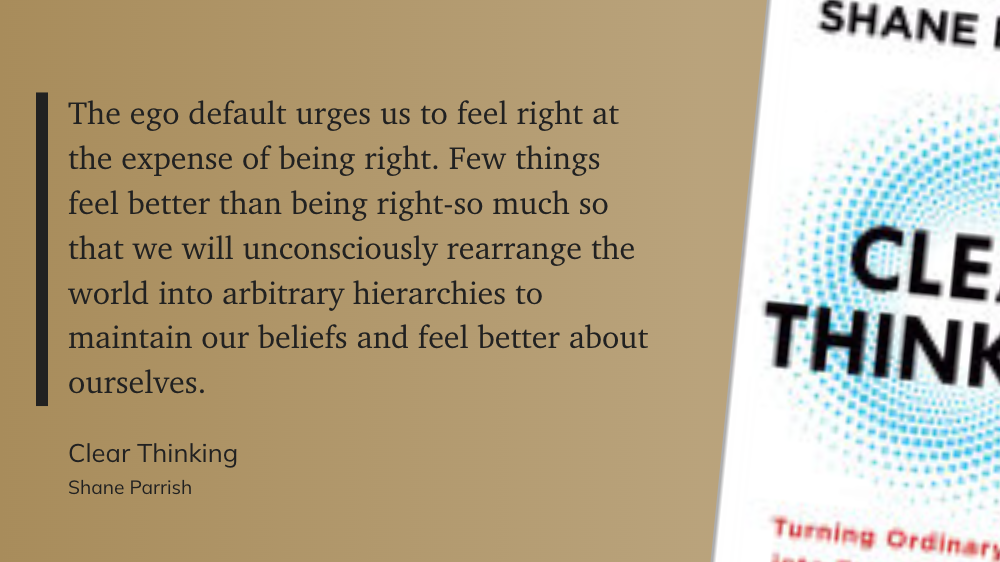
Getting Through the Gate
The quote below struck me because I see this dynamic with my students all the time. Getting young people to quiet down and focus on a primary source from the 18th or 19th century, after lunch let’s say, is not easy. There are strategies to help with this and good teachers utilize them. However, high school students often get lost in the initial attempt to get focused and never get ‘through the gate’ to where their minds are calmer and they are applying their background knowledge and general wisdom to the text, to build meaning. I think many people give up on activities that require sustained focus—like reading—because they don’t often make it ‘through the gate.’ A few years ago the Pew Research Center reported that 23% of American adults hadn’t read a single book in the past year. Americans with ‘a high school degree or less’ were at 39%. Slightly more recent data from the federal government indicates that 51.5% of Americans hadn’t read a book in the previous year.
This inability to continue leaning into something challenging to get through to ‘the focus component’ might also help explain the decline in American’s willingness to prepare food themselves at home. This lands close for me, as I do not enjoy cooking because I find it boring. When I am attempting to cook, I often set up the laptop and listen to YouTube videos. I’d be better served in the long run, if I really wanted to get better at cooking, by focusing on what I am trying to achieve and trying to get into the zone.
I think we all have areas in life where the resistance is hardest and we struggle to get into a focused flow. Maybe it’s reading, or writing, or exercising. Maybe the real challenge is not that we lack focus, but that we don’t give ourselves long enough to reach it. What would change in our lives if we treated that initial restlessness not as a stop sign, but as a doorway?
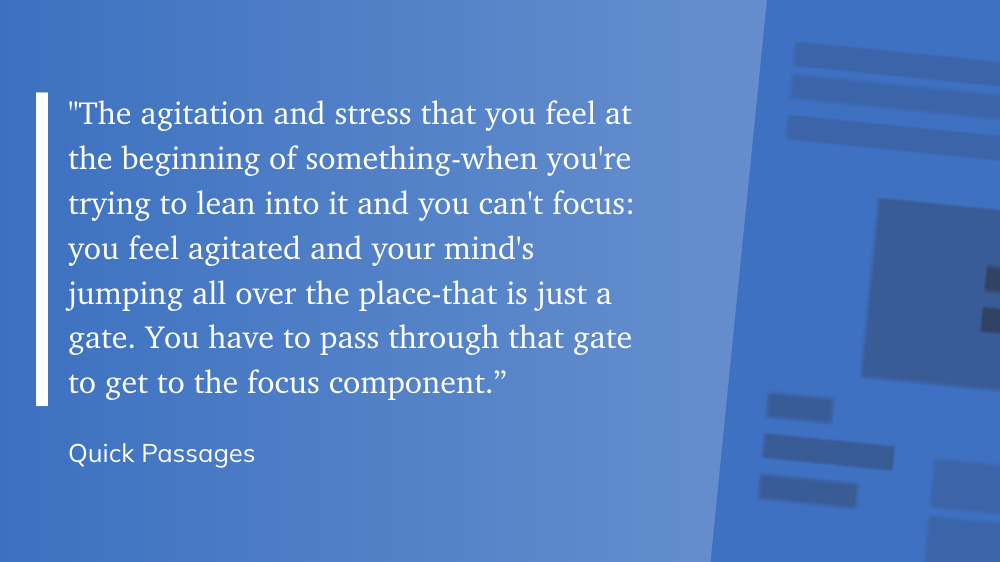
On the Quiet Life
The quote below, which I read on Substack, resonated for a few reasons. For me, it gets at the idea of contentment. I am an admitted productivity nerd. I read all the books, I listen to all the podcasts. My interest, in part, comes from a drive to be better, and better…and better. All the time. However, like the futile goal of always trying to be ‘happy,’ such a goal is a mirage. Instead, I try to remind myself to put forth my best effort and be content with the results. If I do a solid job at work as a teacher, I’ve earned the right to contentment. This is true because my job is hard and the work I do contributes to the common good. Indeed, I’ve earned the right to create a boundary when I am home and to indulge in other pursuits, like reading, trying to stay fit, watching some college football, or hanging out with my family. Our media clearly focuses its attention on the stars, the incredible outliers in their various fields, which is understandable. I get it. Extraordinary achievements are laudable. However, it means most of us need to be vigilant and not get sidetracked into thinking we are not okay because we don’t measure up to the superstar outliers we are constantly seeing online and in the news. Especially if we are working hard and contributing.
Indeed, it often feels a bit radical to reject the idolization of ‘achievement.’ A quirk of my personality is that often when I have down time and I am thinking about what to do, I usually land on the same fork in the road: Sit down with a book or do some ‘work.’ Nowadays, I usually decide to read, but the nagging feeling that I am missing an opportunity to be ‘more productive’ lingers. It is my own toxic productivity hangover. When I really stop to think about it, I actually think I am more impressed with the good, helpful person who is truly content, than with the accomplished striver. Of course, the best in their fields have admirable qualities. Indeed, studying these folks is both interesting and helpful in many ways (it’s one of the reasons I love to read biographies). However, in my mind, true contentment, in a life that is still contributing to society, is more impressive, largely because it is so rare amidst the deluge of influences we all see that fuel our discontent.
I’m with Dr. Park: in a world obsessed with achievement, I want to celebrate contentment.
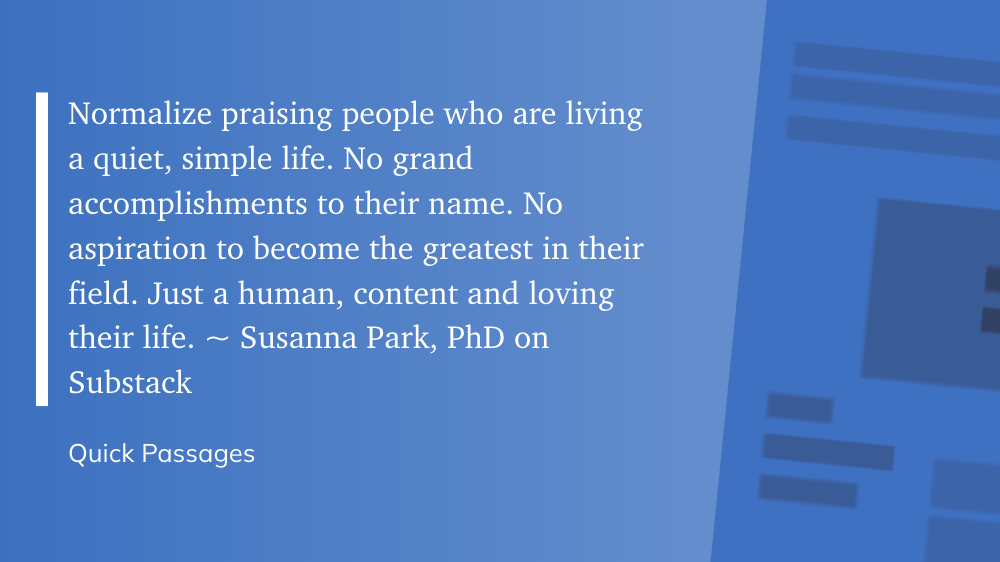
Run a Personal Experiment
An idea that I have come across several times of late is the one shared by Brad Stulberg in his book Master of Change. Indeed, Ness Labs founder Anne-Laure Le Cunff wrote a whole book on the topic called Tiny Experiments, which I recommend.
The idea is to see yourself as a scientist of your own life. That means applying the scientific method to yourself. Instead of avoiding a change or committing fully to a change, run an experiment. That means starting, taking notes, and being okay with a hard stop in the not-too-distant future. If the change is a net positive, you can continue. If it isn’t working out; abandon it and take solace that now you know.
Examples can include subscribing (or unsubscribing) to a service or subscription, or adding a particular food to your diet. Or maybe changing up your workouts. Or changing when you have your smoothie and what goes in it. You get the idea. The possibilities for experimentation are vast.
Importantly, running these experiments can lead to impactful changes to one’s life. Another major benefit of this approach is noted by Stulberg in the quote below: It allows you to start taking action and avoiding the pitfall of paralysis, which we have all experienced too many times. Running ‘tiny experiments’ helps us take action. In my case, I find that taking action leads to a willingness to run more experiments. Thus, my willingness to experiment with my media consumption helped lead me get started on some diet experiments. Such momentum is always welcome.
A recent experiment that I have learned something from has to do with my online reading habits. I love to read and wanted to read more newsletters instead of just books. I went on to Substack and started following several great writers. Unfortunately, their Notes feature lured me in and after a week of liking comments, I had trained the algorithm to feed more political hot takes, which was a big mistake. Visits to Substack got me worked up and definitely harshed my mellow. I decided to delete the app in all the places and make it more difficult to visit in my favorite web browser. I’m bummed that there are some voices I am not hearing anymore (though in some cases I can find their writing or thinking elsewhere), but I am exceedingly pleased that the political noise is tuned way down in my head.
Surely there are a few experiments you can run for yourself.
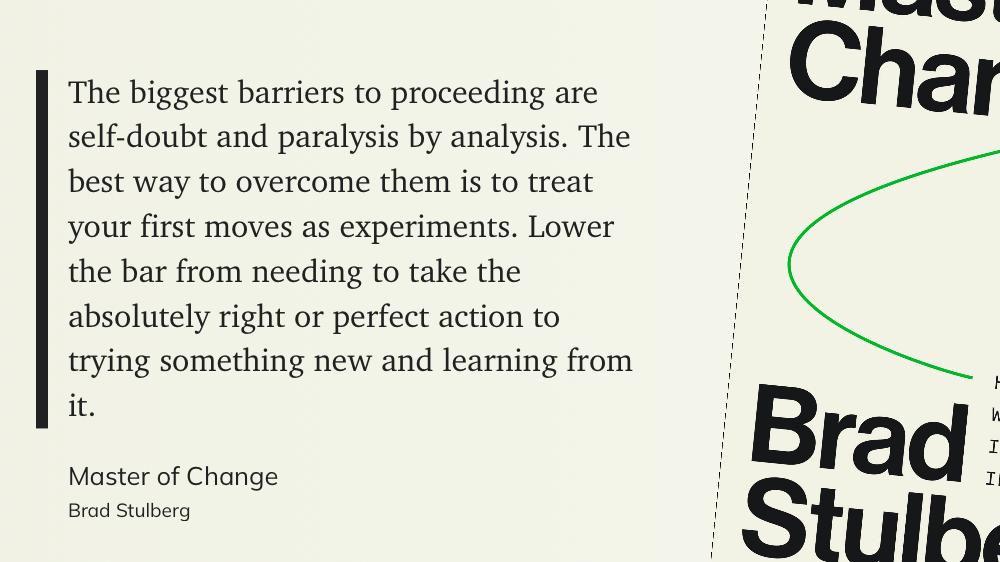
Power and Friendship
This quote from Edward Luce’s recent biography Zbig (about foreign policy guru Zbigniew Brzezinkski) strikes me because it humanizes the pope, a figure revered worldwide and often seen as uniquely above everyday concerns. Zbig, as he was known, was a Polish American foreign policy expert and academic. He had befriended Karol Jozef Wojtyla in the 1970s, the man who would become Pope John Paul II, as a result of their both being prominent Poles. Once he was the pope, he and Zbig communicated regularly, as friends do. To me, this anecdote illustrates that John Paul II was a friend before he became pope–and remained a friend afterward. I think many of us have had daydreams in which we are all powerful and are able to use our unique influence to help our friends and family. I certainly wonder what the church employee who took the call from the Vatican must have thought!
As I write this, we have an American pope, who followed the first pontiff from Latin America. However, when John Paul II became pope in 1978 he was the first non-Italian pope in 455 years, and of course, the first Polish pope. At the time Zbig was serving as president Jimmy Carter’s National Security Advisor. The odds that Zbig, having risen to his high station, had also befriended a Polish priest that would become the leader of the Catholic church is also quite stunning and serendipitous.
Interestingly, the biography also reveals that Zbig was never a devout Catholic. Indeed, he was cremated and his ashes returned by his family to the earth. No cross, tombstone, or memorial marks his grave–a humble end for a man who once shaped global history (and was often not very humble) and who had a powerful friend who could do his wife a kind favor; one that we’d all love to do for our friends had we the power to do it.
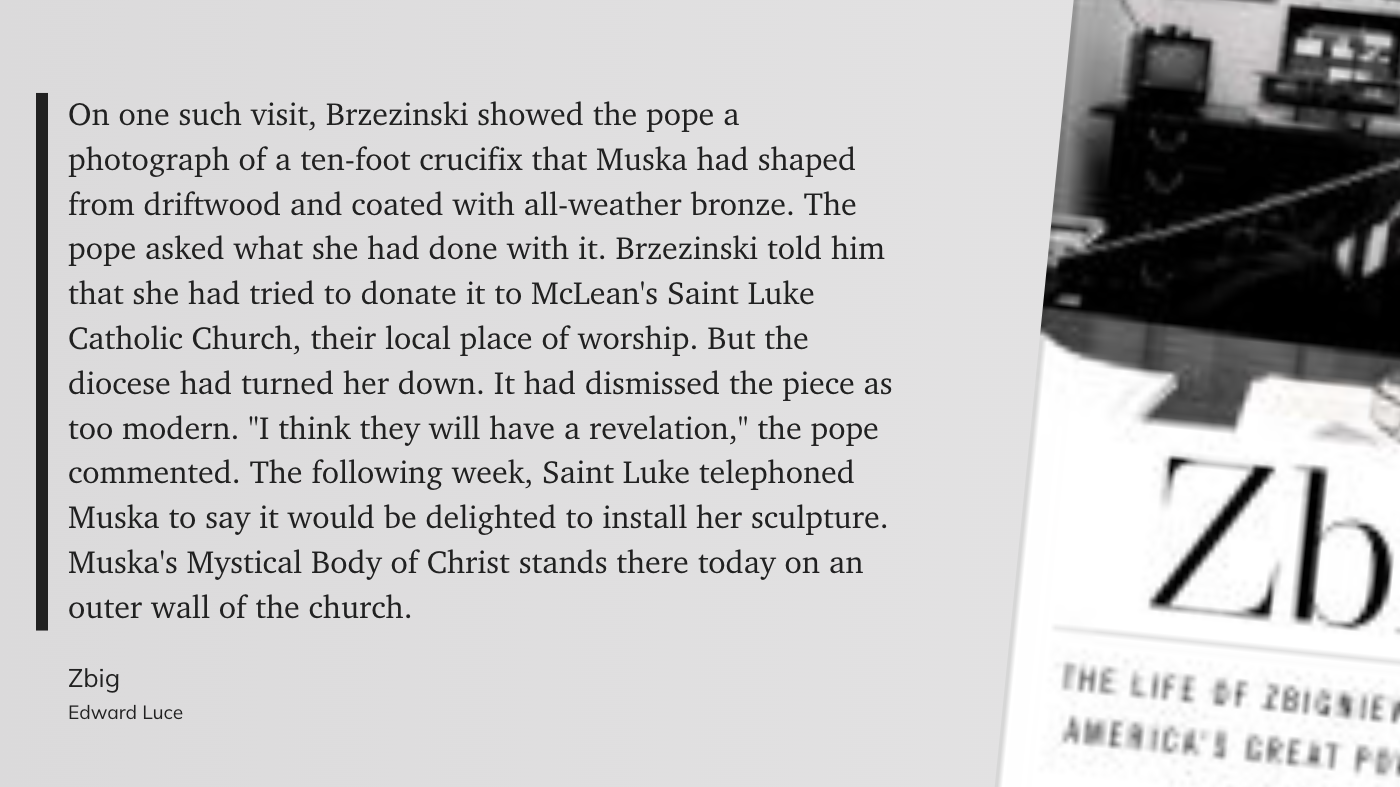
Benefits of WEIRD Marriage
Dr. Joseph Henrich is an anthropologist who teaches at Harvard. I am reading a book of his about WEIRD people; that is Western, Educated, Industrialized, Rich, and Democratic people. For years scientists did their experiments on mostly WEIRD populations and came to conclusions they assumed were true for all of humanity. We now know that WEIRD people are actually a bit weird, and don’t represent the rest of the world in many important ways.
In this book, Henrich explains how the WEIRD roots arose and changed us in ‘the west’ (and later elsewhere as western ideas came to dominate many parts of the world, like in Japan for instance). A huge factor was the Christian Church and its policies. For one, the Church enforced and changed how Europeans thought of marriage. Specifically, the Church established monogamy as the norm and outlawed previously widespread types of marriage such as cousin marriage and polygyny. In societies that allow polygyny, high status men wind up with multiple wives, even harems. However, it also had the effect of making it hard for many low status men in society to find mates.
The quote noted below gets at one of the major positives of this change. Men without wives, Henrich demonstrates, tend to have more testosterone in their systems more often, changing their behavior in many antisocial ways. The flip side is that once men are married, testosterone tends to diminish, leading to generally more caring and mellow dudes. In other words, the rise of monogamy in Europe led, in part, to less less sexual violence, less crime in general, and more trust by men of other men.
This historic development makes me reflect on how many other “givens” in our culture might be the result of centuries-old institutions shaping behavior in ways we hardly notice. If something as personal as marriage norms can be engineered—and can ripple out to influence crime rates, trust, and cooperation—then what other aspects of our daily lives are quietly products of history rather than universal human nature? Even though I remain deeply skeptical of organized religion, I can see how this particular historical turn produced social benefits we still feel today. It’s a reminder that traditions are not simply inherited. Rather, they are crafted, sometimes intentionally, sometimes by accident, and always worth re-examining.
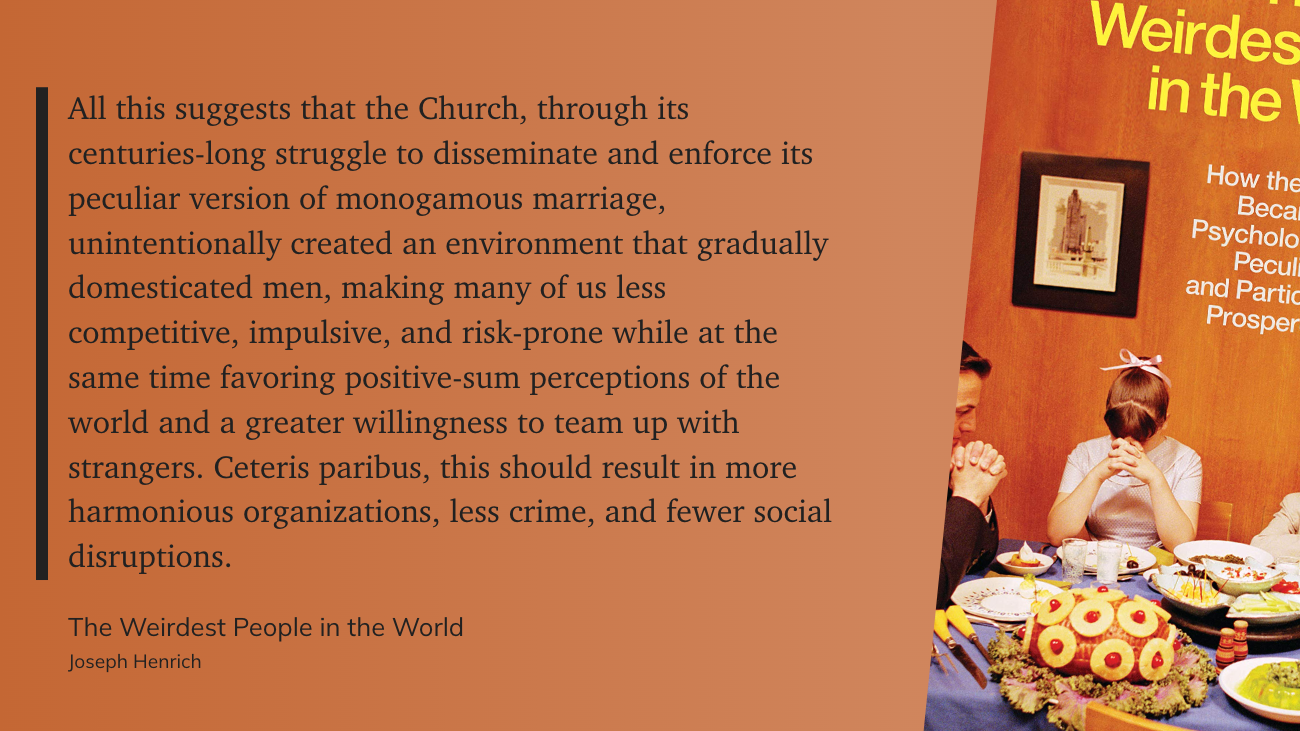
What I Remember from High School Is Not My GPA
One issue nearly all high school teachers face is students who are excessively worried about their grades. To be sure, the student that doesn’t care about their grades presents a more worrisome dilemma, but that does not make the ‘grade grubber’ student any less real or frustrating. As a teacher, when I talk to this young person I hope to convey the idea that the process is more important than the result. I also attempt to convince them that getting a B in an AP class in high school is not the end of the world. I always add that this grade they are worried about iis something they likely won’t think about once they’re out of high school. Like, ever. Sometimes my arguments ease the student’s worry, but I suspect most often my words don’t do all that much good.
A related problem arises when a student who has high A continues to stress out about their grade. This type of student typically has the habits to maintain their success. The quote below, from a 2024 book by Jennifer Breheny Wallace about the dangers of ‘achievement culture’ in America, makes an important point about this type of student that I strongly agree with. Put simply, a meaningful adolescence should involve more than just academic performance. Indeed, thinking back now on my high school experience–many years ago, that is true-–I remember hardly anything about the academic nature of my experience, including specific grades. What I do remember are my friendships, playing football, cutting class on Wednesdays during senior year to drive to Oakland to catch Oakland A’s day games in the bleachers (for something like $5!), and the other emotional highs and lows of my particular experience in the late 80s in a small college town in Northern California. I recognize in hindsight that earning decent grades (I was a straight B student) helped me get into college. However, the grades and their meaning faded quickly.
It is worth noting that our current system is organized in a way that promotes student worries about grades. That is a whole other topic that I will refrain from getting into, but I do think is important not to forget.
Today, I hope my students, as well as my daughter, will approach high school with the wisdom to discern that while grades matter, so do relationships, extra-curricular activities, travel (if one is so lucky), and the pursuit of other interests in the margins of the high school experience. Of course, students today have additional pressures caused by phones and social media that I didn’t have to deal with in the ‘80s. Nevertheless, it’s a critical balance; and while it is hard to nail it, having a well rounded experience in high school is worth the effort. Wallace nails this idea with these 12 words.
